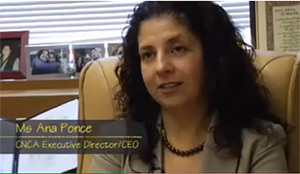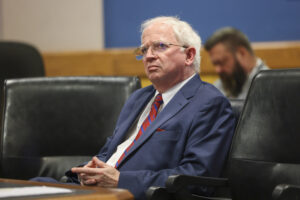The Education of Ana Ponce: A Success Story
Succeeding against all odds certainly describes Ana Ponce, chief executive officer of Camino Nuevo Charter Academy, which runs five charter schools, the majority in the most crowded, impoverished and gang-ridden section of Los Angeles. During this dreary age of war and economic hard times, I sometimes consider looking for stories that make me feel good.
During this dreary age of war and economic hard times, I sometimes consider looking for stories that make me feel good.
This seems contrary to the usual journalistic perspective, which centers on bad news. Through much of my life as a reporter and editor at the Los Angeles Times, I embraced the dark side, digging into homelessness, crime, drugs and other societal ailments. But I also saw that much could be learned from more positive stories. Sometimes I did write about kids and teachers making it in poor areas and police officers connecting with people and neighborhoods rather than following the department’s style of behaving like an occupying army. By the time I was city editor, I had a real fondness for stories in the general classification of “succeeding against all odds.”
Succeeding against all odds certainly describes Ana Ponce, chief executive officer of Camino Nuevo Charter Academy, which runs five charter schools, the majority in the most crowded, impoverished and gang-ridden section of Los Angeles.
That’s where Ponce grew up, the non-English-speaking daughter of Mexican immigrants who made a scant living doing odd jobs. After elementary school, her parents managed to find a way to send her to Catholic schools known for their academic rigor, discipline and safety. She then graduated from Middlebury College in Vermont, got master’s degrees from Columbia and UCLA and is now studying for her doctorate at Loyola Marymount University in Los Angeles.
She returned to her old L.A. community to show this generation of poor Latino kids what’s possible. We talked in the office of Jose A. Castellanos Elementary, one of the five charter schools. It is located in a fairly new building designed in a simple industrial style, cold on the outside, pleasant within its walls. Just east is MacArthur Park, and Ponce’s former Pico-Union neighborhood. These places are at the heart of a wide area where armed gangs battle over the drug trade and control of extortion businesses that target struggling merchants. The dominant, often only, language is Spanish. This is where Ponce’s journey from Pico-Union began.
“If you live in Pico-Union, the probability of you going to UCLA is very, very low,” she said. “We in this area have a completely unacceptable dropout rate, where we have half the students graduate from high school. … For a college education, I believe we are looking about 9 percent in this community.”
The Camino Nuevo charters aim to break this pattern with intensive concentration on each of their 2,000 students. Charters are public schools financed by public funds. Like other charters in Los Angeles, the Camino Nuevo schools were authorized by the Los Angeles Unified School District. State laws exempt charters from many traditional requirements. The most controversial of these is their exemption from district-union contracts and work and seniority rules.
“Our high school has a graduation rate of 95 percent,” Ponce said. “We get 70 percent of our kids eligible for a four-year college. Fifty to 60 percent of those actually go.”
Teachers are hired on one-year contracts. Educators who also serve as teacher-coaches evaluate them frequently. The evaluators and the teachers discuss each student. The evaluators also observe the classrooms and check on whether the teachers are preparing and following lesson plans. They use student test scores as part of their evaluation.
The schools concentrate on parents, important in an area where mothers and fathers, like Ponce’s, don’t speak English and spend many hours at their low-paid jobs. “Every school has a parent coordinator who teaches parents to be their child’s best advocates,” Ponce said. “The principal is supposed to be accessible to parents all the time, not just when there are problems.”
And a coordinator at the high school follows students once they are in college. “Her job is to support kids in any way,” said Ponce. “Some of them don’t know how to navigate the tutoring system, some of them get stuck on financial aid issues, and some of them have socialization issues. It is a huge cultural shift.”
The goal is to break the Pico-Union/MacArthur Park dropout cycle. “By having a concentrated effort in the MacArthur Park area, we will begin shifting the ecology to where higher education becomes part of the rhetoric, where someone dropping out of high school is not accepted. … The more kids we graduate, the more kids we send off to college, the more [other] kids start to see themselves in them,” she said.
But it takes extraordinary resources to do this, and the state budget signed by Gov. Jerry Brown will reduce funds to every public school in California, including the Camino Nuevo charters. This is happening all over the country, and the blame rests with state governments and Washington. Camino Nuevo is fortunate. It has a board with wealthy fundraisers who can persuade others of their kind to donate. But traditional schools and many charters are planning to increase class size and reduce faculty in expectation of the cuts.
I drove away from Castellanos Elementary past the crowded old apartments and houses on streets deserted late in the afternoon. A few of the kids living there will make it, as Ponce did. Hopefully more will do so than when she was growing up.
But the odds are still stacked against success as long as we and our government refuse to approve the taxes needed for future generations.
Your support matters…Independent journalism is under threat and overshadowed by heavily funded mainstream media.
You can help level the playing field. Become a member.
Your tax-deductible contribution keeps us digging beneath the headlines to give you thought-provoking, investigative reporting and analysis that unearths what's really happening- without compromise.
Give today to support our courageous, independent journalists.






You need to be a supporter to comment.
There are currently no responses to this article.
Be the first to respond.